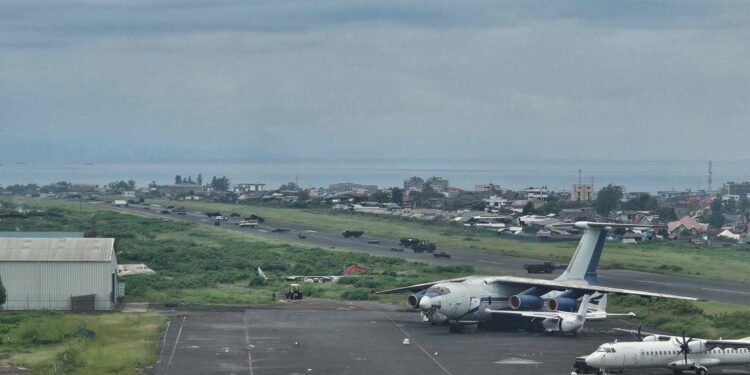
The Southern African Development Community (SADC) refutes allegations its now terminated mission in the eastern Democratic Republic of Congo (DRC) is part of joint military operations against M23 (Mouvement du 23 Mars) forces.
The SADC mission – SAMIDRC – ceased operations on 13 March with “a planned withdrawal” of troops and equipment to follow.
A 14 April SADC statement reads that the regional bloc notes “with deep concern” an Alliance Fleuve Congo/March 23 Movement (M23) 12 April communique alleging SAMIDRC is part of joint military operations alongside the Armed Forces of the DRC (FARDC), the Democratic Forces for the Liberation of Rwanda (FDLR) and the Wazalendo militia in Goma against M23.
“SADC firmly refutes these allegations. SAMIDRC has not participated in any joint operations as claimed. These assertions are both inaccurate and misleading.
Earlier this week, the AFC/M23 issued a statement following an uptick in fighting around Goma saying that, “despite our restraint in response to these persistent criminal acts, the AFC/M23 finds itself compelled to reconsider its position to prioritise the security of the Congolese population and that of the SAMIDRC elements present in the liberated areas”.
“In alignment with the directive of the SADC Summit of Heads of State and Government, SAMIDRC is currently implementing a structured and co-ordinated withdrawal from the DRC,” the SADC stated.
“SADC further reaffirms its commitment to the agreements reached during the consultative engagement held on 28 March in Goma between SADC and the leadership of M23. The organisation remains dedicated to supporting peaceful and diplomatic efforts aimed at achieving lasting stability in the eastern DRC.
“The SADC Secretariat urges all parties to act responsibly, refrain from the spread of misinformation and work collectively toward de- escalation and the restoration of peace in the region,” according to the latest SADC statement.
Defence expert Dean Wingrin said the situation in North Kivu is rapidly deteriorating as Congolese government forces are on the offensive against Rwandan forces/M23, who are firing back with rocket launchers not far from the SAMIDRC base in Sake. Roads in and out of Goma are closed, and the M23 is wanting to cancel the agreement for the SADC exit via air from Goma. The M23 is blocking the Goma runway, which only needs minor repairs to become fully serviceable.
Rwanda’s New Times reported on Thursday that a high-placed source confirmed that a request has been made to the Government of Rwanda to facilitate the exit of SADC/SAMIDRC troops from the eastern DR Congo through Rwanda.
“This is a welcome development that’s in line with the Africa-led process to find lasting peace and security in the region, and the exit will be facilitated in a friendly manner,” the source told New Times on Thursday morning, confirming the request came in this week.
“The agreement with Rwanda-supported AFC/M23 to open Goma Airport and airlift SAMIDRC troops and equipment back home has collapsed,” Wingrin said, with the M23 renegading on the agreement. “Rwanda is calling the shots,” he added.
A revised withdrawal plan arising from a meeting on Friday 11 April by chiefs of the three defence forces that contributed troops and equipment to SAMIDRC (Tanzania, Malawi, and South Africa) noted a delay in the reopening of Goma airport, and confirmed withdrawal would be via road from Goma through Rwanda to Tanzania.
Eastern DRC was on the United Nations Security Council (UNSC) agenda this week, with the UNSC hearing that notwithstanding numerous regional and international diplomatic initiatives the security situation remained critical.
UN Special Envoy for the Great Lakes Region Huang Xia told the UNSC the Congo River Alliance/M23 rebel group continues its territorial expansion. This is happening despite calls from the Security Council, African regional and sub-regional organisations in Africa and the European Union (EU). Pressure is also being applied through restrictive measures and sanctions.
A ceasefire is not yet effectively in force, violations are ongoing and the humanitarian crisis is deepening – both in the DRC and neighbouring countries such as Burundi, Uganda and Rwanda, which have seen an increase in Congolese refugees.
“This sombre reality means that we have to strive to redouble efforts to see how together we can transform recent political and diplomatic progress into an irreversible shift to peace,” Xia said. He welcomed what the world body termed “the recent dynamics” surrounding the Nairobi and Luanda processes, supported by the African Union (AU), the East African Community (EAC) and SADC.
He welcomed “a new resolve” by President Felix Tshisekedi’s government to engage directly with M23 as an important step. “Given the serious nature of the crisis, obtaining an immediate unconditional ceasefire and reaching agreement on reopening humanitarian corridors should, in my opinion, be the primary issue on the agenda of discussions between all parties concerned,” Xia is reported as telling the UNSC, under the chairmanship of Ambassador Fu Cong, China’s permanent UN representative, for April.










